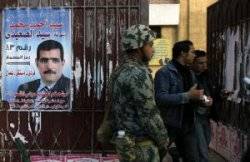Egypt's army rulers have issued a decree handing presidential powers to Prime Minister Kamal el-Ganzouri but keeping control of military affairs and the judiciary, the official news agency said .
The military, in charge since leader Hosni Mubarak was overthrown in February in a popular uprising, has been under pressure to speed a promised transition to civilian rule .
It appointed Ganzouri as interim prime minister after the former cabinet resigned last month during clashes between police and protesters demanding that the army step aside .
On Wednesday, as the military council announced the decree, Ganzouri named his new cabinet. The Mubarak-era politician appointed Mohammed Ibrahim Yusuf, a former police chief from Cairo, to the key position of interior minister, state television reported .
The new finance minister is Mumtaz al-Saeed, while the foreign minister from the former cabinet, Mohammed Kamel Amr, was reappointed .
The head of the military council, Field Marshal Hussein Tantawi, attended the swearing in of Egypt's third interim cabinet since Mubarak was toppled in February, state television said .
A day earlier, Ganzouri called on the country's political forces to pull together to help resolve the country's problems .
He singled out the faltering economy, hit by a decline in tourism and a sharp fall in investment, as well as security which he said had deteriorated since the 18-day uprising that ousted Mubarak .
."We can't leave security and the economy like this," he told a media conference
"The political roadmap is now clear", leading to a full transfer of control to the new civilian leaders from the army, which took power after Mubarak stepped down, he added.
Landslide victory
The decree on Wednesday came as Egypt's top Islamist party announced it had extended its gains in the first elections since the fall of Mubarak .
The Muslim Brotherhood's Freedom and Justice party (FJP) said 24 of the 44 winners announced by election committee chief Abdel Moez Ibrahim were its candidates, along with four winners it supported as allies .
Ibrahim announced the winners at a news conference late on Wednesday, though he did not give their party affiliations.
The candidates were forced into run-offs this week after failing to get an outright majority in the first round of voting November 28.
The ruling military has decided on a complex election system in which voters cast ballots for party lists, which will comprise two thirds of parliament, and for individual candidates for the remaining third of the lower hosue.
FJP spokesman Ahmed Sobea said that, after the run-offs, his party controlled 32 out of 56 individual candidate seats that were contested in the first round, and said another four successful candidates were party allies .
Two more rounds of voting will be held over the next five weeks .
Sobea said FJP candidates won six seats in districts where elections were frozen after legal complaints, and two other seats were won outright in the first round .
The Salafist Al-Nour party, said it won five seats in the run-offs, and other seats were divided among smaller liberal and Islamist parties .
The FJP, which the long-banned fundamentalist Muslim Brotherhood formed after Mubarak's overthrow in February, had already won 36.6 per cent of party list votes in the first round .
PHOTO CAPTION
Egyptian voters leave a polling center as an army soldier stands guarding in Cairo, Egypt, Tuesday, Dec. 6, 2011
Aljazeera


 Home
Home Discover Islam
Discover Islam Quran Recitations
Quran Recitations Lectures
Lectures
 Fatwa
Fatwa Articles
Articles Fiqh
Fiqh E-Books
E-Books Boys & Girls
Boys & Girls  Hajj Rulings
Hajj Rulings Hajj Fatwas
Hajj Fatwas














